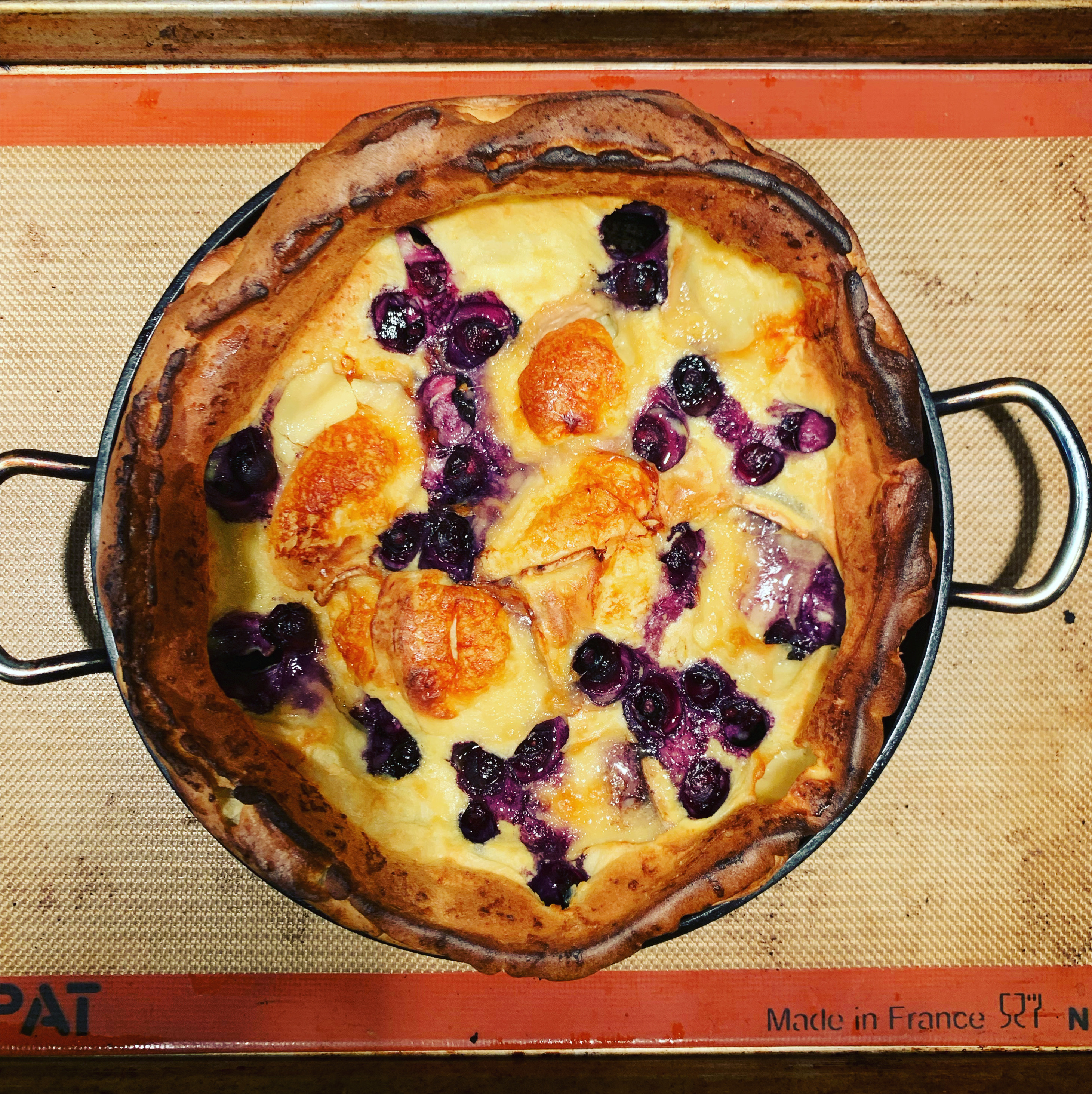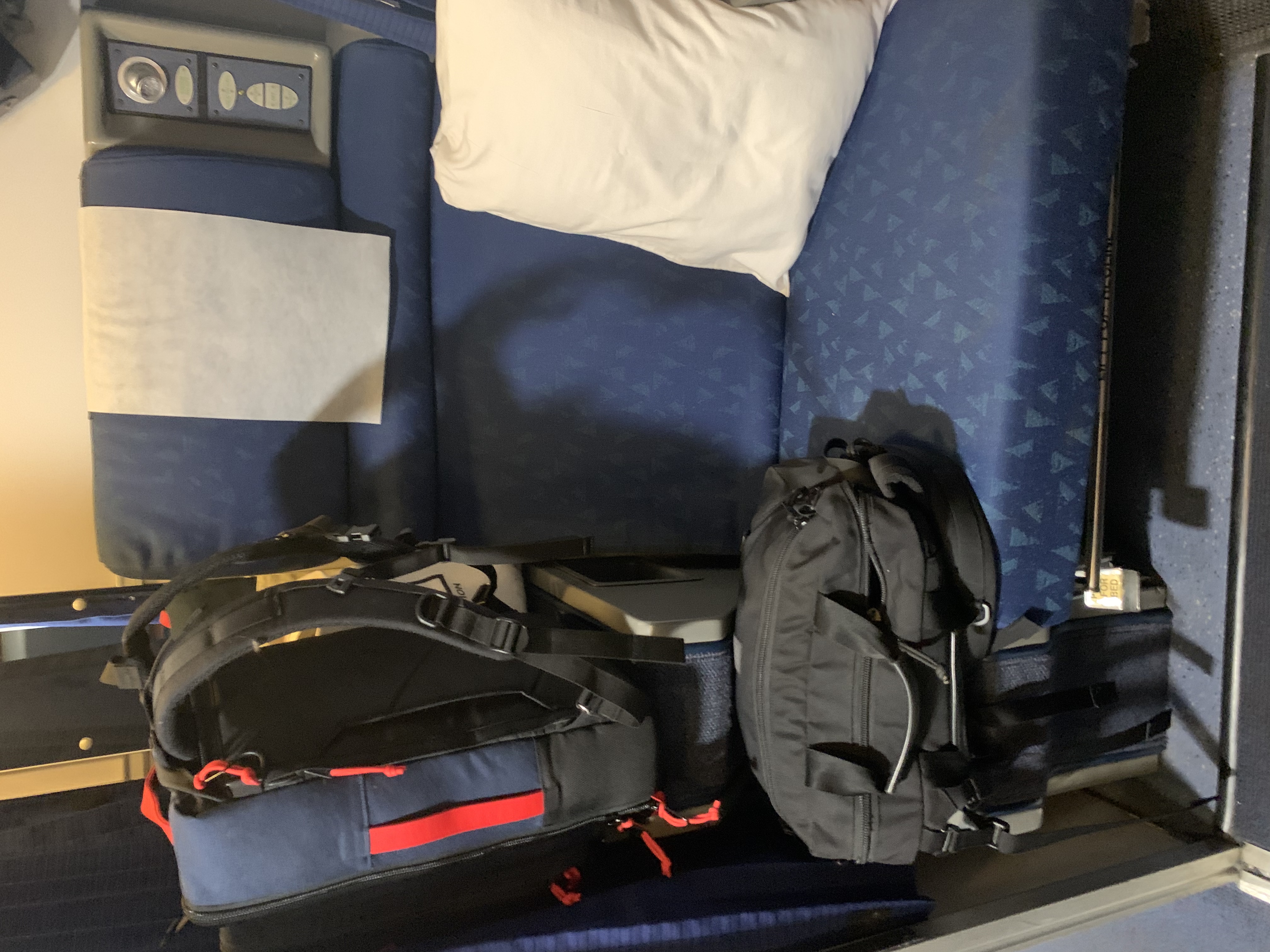Archive for 2021
-
🔖 Community Land Conservancy Sees a Green Future for Communities of Color | South Seattle Emerald –
Article by Amanda Ong on the recently formed organization.
“But this inherently pushes the focus of land conservancies to rural areas. You want to acquire the largest parcel of land and set it aside,” Watts said. “You can read between the lines on that — how that does not serve Communities of Color. It’s focused on areas where there are the least number of People of Color. It is focused on the opposite of housing and development.”
-
I don’t like to commit to self-improvement or curiosity projects publicly, but I’m feeling oddly compelled to spend time learning Forth over winter break. Was this triggered by Collapse OS, synstack, or acidforth…?
-
Lighting the Way has been one of my major projects over the last two years, and I’m thrilled to announce our final report is published. Read more in the thread - and thanks to the many people involved in the project!
-
Facilitating and Illuminating Emergent Futures for Archival Discovery and Delivery: The Final Report of the Lighting the Way Project
-
Thrilled to see my review of Esther Milne’s Email and the Everyday: Stories of Disclosure, Trust, and Digital Labor published in C&RL! I quite enjoyed reading this.
-
🔖 Antonio Lafuente, "Los laboratorios ciudadanos y el anarchivo de los comunes" –
Necesitamos un archivo pero no a cualquier precio. Para ser clave en la configuración de lo colectivo tendrá que hacerse sensible a las dimensiones de lo común sin abandonar su origen como repositorio de lo público.
-
Watching #DLFForum’s collective response to our panel on defending the commons in libraries & archives is pretty amazing. Thanks to copanelists Thomas Padilla, Rosalyn Metz, Shannon O’Neill, and Eira Tansey!
See our slides and Zotero group library.
-
Open to All? Creatively Imagining, Realizing, and Defending the Commons in Libraries and Archives
Commons areas have been constituted through history as places open to all. The LAM sectors describe our work using the term. What if our work reflects a history of commodification? We explore the realization of the commons as an interdisciplinary goal and how to creatively respond to threats of enclosure.
-
I am thrilled to announce that we published The Lighting the Way Handbook: Case Studies, Guidelines, and Emergent Futures for Archival Discovery and Delivery. This is a major milestone for us - and it was published just in time for #DLFForum! Thanks to both the many contributors, as well as IMLS, who supported our project through a National Leadership Grant for Libraries. Read more about it.
-
Email and the Everyday: Stories of Disclosure, Trust, and Digital Labor by Esther Milne. Cambridge, Mass.: MIT Press, 2021
-
The Lighting the Way Handbook: Case Studies, Guidelines, and Emergent Futures for Archival Discovery and Delivery
-
🔖 Ludwig Yeetgenstein, "Nameless Feeling" –
As an analytic, vibes don’t connect feelings and consequence; as such, it is symbiotic with passive modes of media consumption.
-
Cons(train)ed music: a kit for the traveling ambient artist
After an intense year and a half (pandemic, work, other personal stuff) I needed a vacation. I booked a trip on the Amtrak Empire Builder to go from Seattle to Milwaukee and Chicago. Because of persistent low-grade burnout, I wanted to use the considerable time I’d have offline to work on creative projects including music and writing. This is a brief writeup inspired by The Setup that talks about what I brought with me in an effort to travel relatively light.
-
Lighting the Way: Improving discovery and delivery for archives and special collections
This webinar will share outcomes and new work from Lighting the Way, an IMLS-funded project focused on improving discovery and delivery for archives and special collections. Through a forum (February 2020) and virtual series of working meetings (April - May 2021), the project engaged stakeholders and experts including archives, library, and technology workers, to build consensus around strategic and technical directions to improve user experience, access, and interoperability across user-facing discovery and delivery systems for archives, and to provide a model for values-driven technology work within archives and special collections. The project has been developed using facilitation guidelines and activities from non-traditional sources, primarily the Liberating Structures framework, which supports engaged, collaborative, and creative problem solving. Project team members and participants will provide an overview of Lighting the Way activities; share their experiences with the facilitated collaborative writing process; and discuss the forthcoming Handbook, the primary written output from the project. -
🔖 Interseccionalitat i arxius. Un programa i quatre projectes — Servei d'Arxiu Municipal de Lloret de Mar –
Presented by Jordi Padilla-Delgado at #SAA21RF.
-
The Care and Maintenance of Archival Innovation: The Lighting the Way Working Meeting as incubator for a sociotechnical investigation of archival discovery & delivery
Archives and special collections have invested heavily in the ecosystem of systems supporting their work over the past ten years and beyond, and have made significant improvements in archival discovery and delivery (finding, accessing, and using archival material). While the pandemic and shift to remote work has required many archivists to innovate in their work, deeper and more inclusive collaboration on this work has remained challenging. The Lighting the Way project team adapted a planned in-person Working Meeting to a series of online and asynchronous activities for participants to engage in a facilitated practice to develop ideas and written contributions on archival discovery and delivery. Drawing from a pool of over 100 applicants across 24 groups, a cohort of 9 groups and 52 individual participants developed topics and ideas from their initial submissions through the use of McCandless and Schurtau’s Strategy Knotworking framework, a refinement and adaptation of the Liberating Structures facilitation methodology. Facilitators worked with participants in both plenary and group-focused sessions to guide a collaborative process centered on the role of archival practitioners. -
made a buttermilk cake.

desperate measures to use up overly ripe strawberries and boysenberries
-
I’m continually getting more sensitive to my own expectations around the rate of change within organizations. This is particularly true around the processes and structures need to enact and support sustainable change even when it is being rightfully demanded.
-
Looking forward to joining the Society of California Archivists for the First Fridays discussion on July 2 about my keynote at #agm2021. More info and registration.
-
🔖 David James Hudson, Yoonhee Lee, Ebony Magnus, and Baharak Yousefi: Considering the MLS –
But simply removing the MLS, without fundamental structural change, is not a path towards racial liberation. It is a path towards decredentialization and devaluation of our labour, which has hurt and continues to hurt our communities disproportionately. In articulating this position, we think not only of the context of the MLS and librarianship, but of other areas of work, whether it be the cost and relevance of a teaching degree, or the cost and relevance of taxi licenses. Deregulation does not lead to utopia.
-
🔖 The Blue Tape List – Rands in Repose –
I have a modified and simplified version of my contractor’s blue tape advice:
- In a new context, you’re going to notice everything that feels off.
- Make a list of everything that feels off, no matter how big or small.
- Wait a bit, like a month, but address everything. …
It’s a surprise when a month passes, and you review your blue tape list and discover how items that seemed urgent at the time now seem entirely irrelevant.
-
Episode 013: Anarchivists
-
Spending some time post-vacation catching up reading Ali Alkhatib’s CHI 2021 paper, “To Live in Their Utopia: Why Algorithmic Systems Create Absurd Outcomes”. It’s interesting to read this paper as a conversation with broader ideas of utopia, as well as imaginaries, as well as work like Fred Moten and Stefano Harney’s “The University and the Undercommons” (Social Text 22(2), 2004).
-
🔖 Kyra Yee, Uthaipon Tantipongpipat, Shubhanshu Mishra, "Image Cropping on Twitter: Fairness Metrics, their Limitations, and the Importance of Representation, Design, and Agency" –
The full paper related to Rumman Chowdhury’s blog post, “Sharing learnings about our image cropping algorithm”.
Twitter uses machine learning to crop images, where crops are centered around the part predicted to be the most salient. In fall 2020, Twitter users raised concerns that the automated image cropping system on Twitter favored light-skinned over dark-skinned individuals, as well as concerns that the system favored cropping woman’s bodies instead of their heads. In order to address these concerns, we conduct an extensive analysis using formalized group fairness metrics. We find systematic disparities in cropping and identify contributing factors, including the fact that the cropping based on the single most salient point can amplify the disparities. However, we demonstrate that formalized fairness metrics and quantitative analysis on their own are insufficient for capturing the risk of representational harm in automatic cropping. We suggest the removal of saliency-based cropping in favor of a solution that better preserves user agency. For developing a new solution that sufficiently address concerns related to representational harm, our critique motivates a combination of quantitative and qualitative methods that include human-centered design.
The analysis code is also available.
-
🔖 WebAnnotation in the Browser –
Very generally: annotations are content about content.
And I thought we had challenges describing metadata as data about data… Anyway, this is interesting, especially from the standpoint of annotation discovery and moderation.
-
Thanks to all of you who attended my @calarchivists #agm2021 keynote in real time! I’m thrilled to announce that the recording is now available: https://www.youtube.com/watch?v=u93Iss8CA7U
-
🔖 Rally to Sell Shares of Rare Declaration of Independence | Art & Object –
Rally … will offer 80,000 shares of a rare copy of the Declaration of Independence to the general public this month. … The copy is a Walsh 15 Broadside—printed in July 1776 in Exeter, New Hampshire … one of only 20 Walsh copies created and currently in private ownership.
Once again, I ask: How have the New Enclosures been worked?
-
🔖 Digital Library Software Developer, Access and Discovery Team (3 positions) | Stanford Libraries –
We’re hiring for three software developer positions, at junior, mid-, and senior levels, to join our team at Stanford Libraries. Remote-friendly; great colleagues, and rewarding projects. Apply by May 28 for earliest consideration!
-
Really enjoying leaning into writing with Ulysses - it’s kind of a dream come true from the standpoint of working with Hugo. It’s nice on desktop/iPad, but wish the Working Copy integration on iOS were slightly smoother.
-
Because my Sourcery post was so controversial^W popular I had to adjust the Webmention configuration to show more replies. Nice problem to have, I guess?
-
On Sourcery, or the enclosure(?) of remote access
In this post, I try to unpack some of my concerns around Sourcery as raised in my Society of California Archivists keynote, and how they relate to the visibility of archival labor, austerity, and enclosure. -
Yesterday, I gave the keynote at the #agm2021. The session was recorded but not yet freely available. I’m hoping to rework the text for publication, but on request, I’m willing to share the text of my talk, so contact me accordingly.
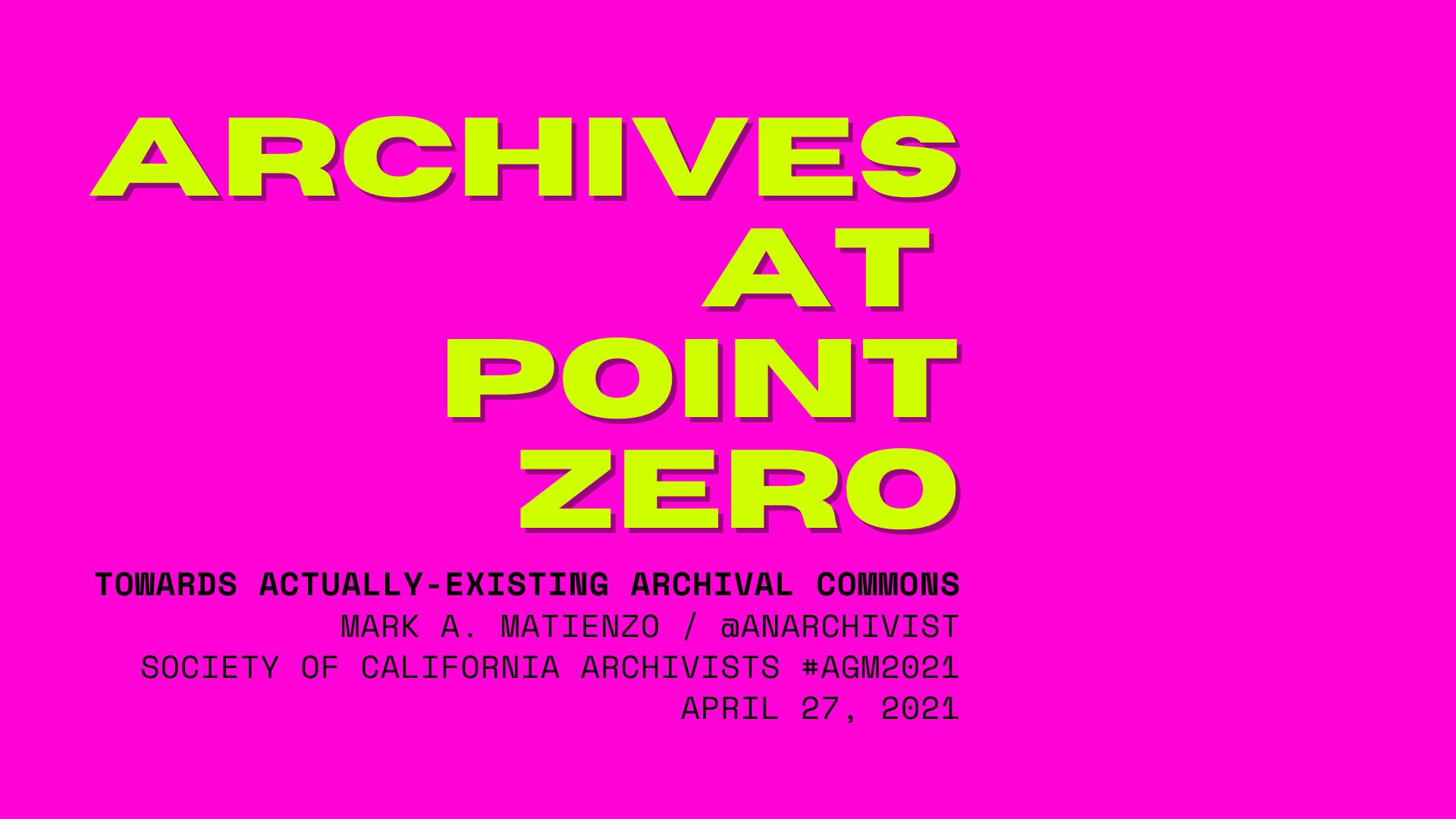
The title was ‘Archives at Point Zero: Towards an Actually-Existing Archival Commons.’
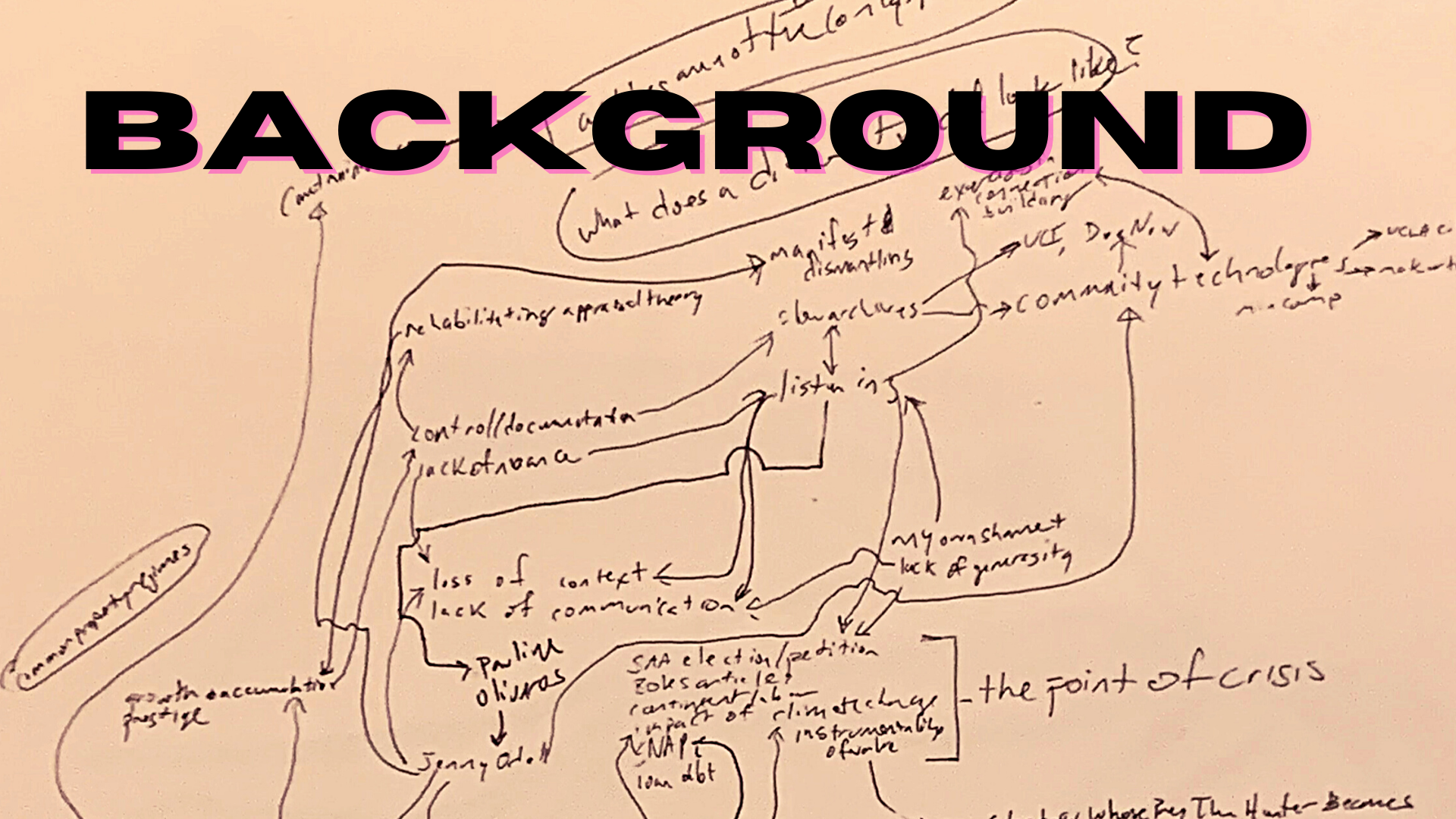
Here’s a mindmap of related topics from when I was first asked to give a talk for the canceled 2020 Western Archivists Meeting.
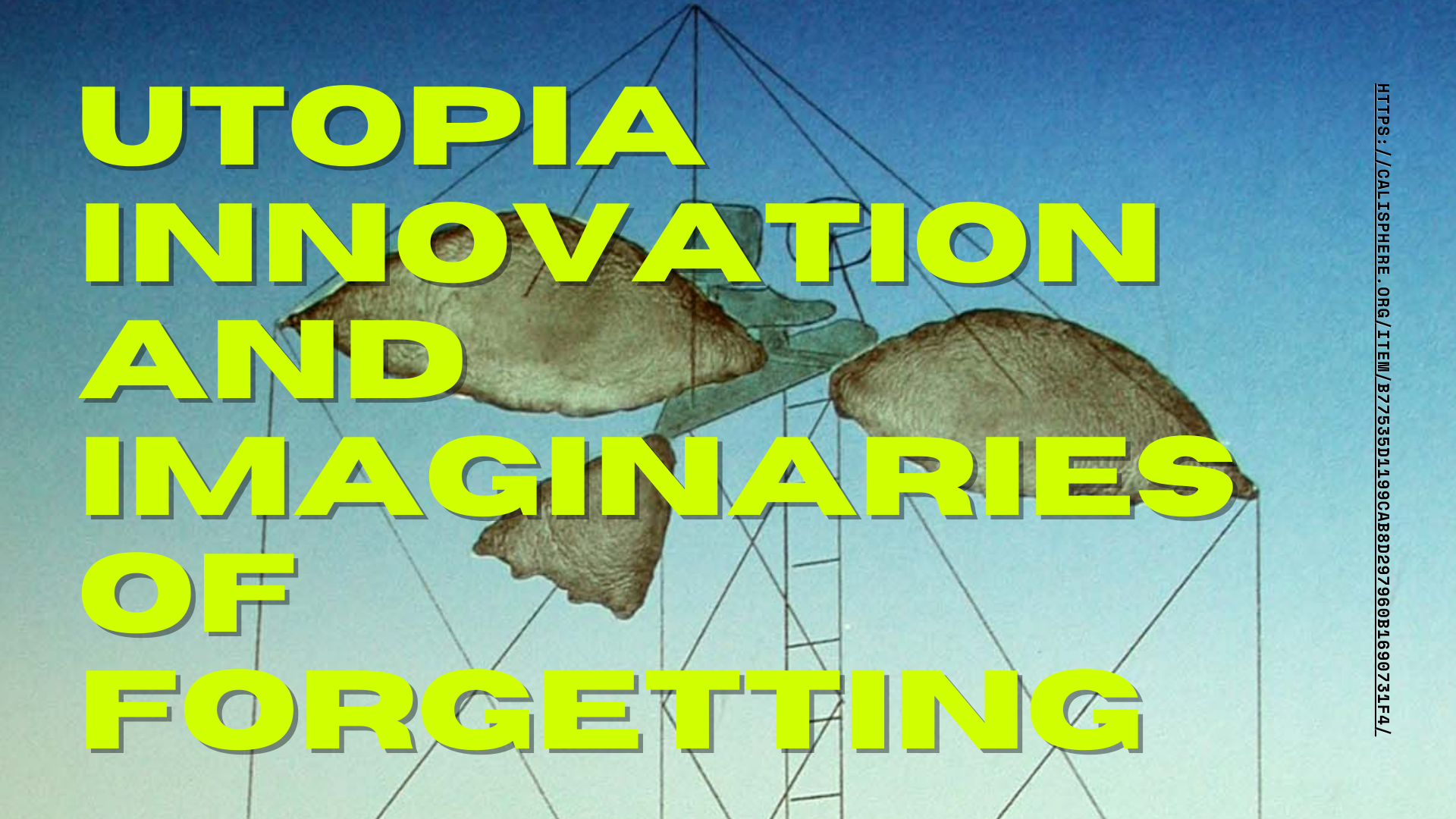
I used lots of images from Calisphere, like this one.

I also used a lot of Ursula K. Le Guin quotes.
-
Archives At Point Zero: Towards Actually-Existing Archival Commons
The past year has been a profound challenge to everyone, including archivists and the communities they serve. We have struggled to respond and evolve across frequently turbulent connections between maintenance, innovation, and care, as well as increased demands from researchers and our own institutions to provide service. As always, we also experience amidst our own fears of relevance and being understood. In this talk, we will explore these interconnections, our tendency to be defensive, the potential threats facing archives from certain innovations, and our own continued collaborations as networks of care. -
🔖 Interview with Jon Corbett - esoteric.codes –
Great longform discussion with Jon Corbett, an Indigenous computational media artist, and creator of Cree# and the Indigenous Computing Framework.
I started to see how the living and dynamic characteristics of culture can be represented as digital structures on which to build my programmatic language; and is also one of the reasons I needed to define an “Indigenous Computing Framework”. I needed to be able to describe the system in organic terms with respect to the cultural awareness of the programming platform, so things like language sensitivities, cultural practices, digital object behaviours, etc… could be presented with this kind of “meta-language” that carries the cultural metaphoric representations and relationships to the system and extended programmatic functions.
His extended abstract for Programming ‘18 also shares more of his research framework.
-
🔖 Week in Review Leadership Comms | Lara Hogan –
I was recently referred to Lara Hogan’s post on Week in Review writeups for teams that are internally public:
Though the teams who reported to me were the primary audience for this doc, I kept it internally-public, meaning that anyone at the company could read and comment in it. I found that some other managers just weren’t talking about hard things that were happening, or addressing rumors that were going around, or giving heads-ups on changes, and often people on my teams would share my Week in Reviews with people on other teams, so that they could have the info too. I invited comments on the document, and didn’t “resolve” or delete comments I received, because I wanted folks to be able to see the answers to questions out in the open.
Her additional insights on how to use them to address “Why Don’t They Just…?” questions are also super, super useful.
-
Digital Libraries at Stanford: Infrastructure, Services, & Projects for Accessible Content
-
🔖 R.A. Hawley, "Middle Management" –
The appeal of the centrist escape hatch for designers isn’t hard to grasp. You fall in love with something — skyscrapers, letterforms, robots, websites, cars — and dedicate yourself to its craft, only to run headlong into the cruel depravity of its mode of production. Caught between the thing you love and are paid to do and the political implications of doing it, a trap door appears beneath you: What if capitalism could be designed around? One could infer that the seminal impulse of design-as-politics is bargaining with the nature of politics, as one might do with grief — a compulsive search for loopholes, in which the underlying problems are swapped out for satisfying puzzles.
-
experimenting with @edsu’s etudier to visualize some citation networks of vanity searches in Google Scholar.
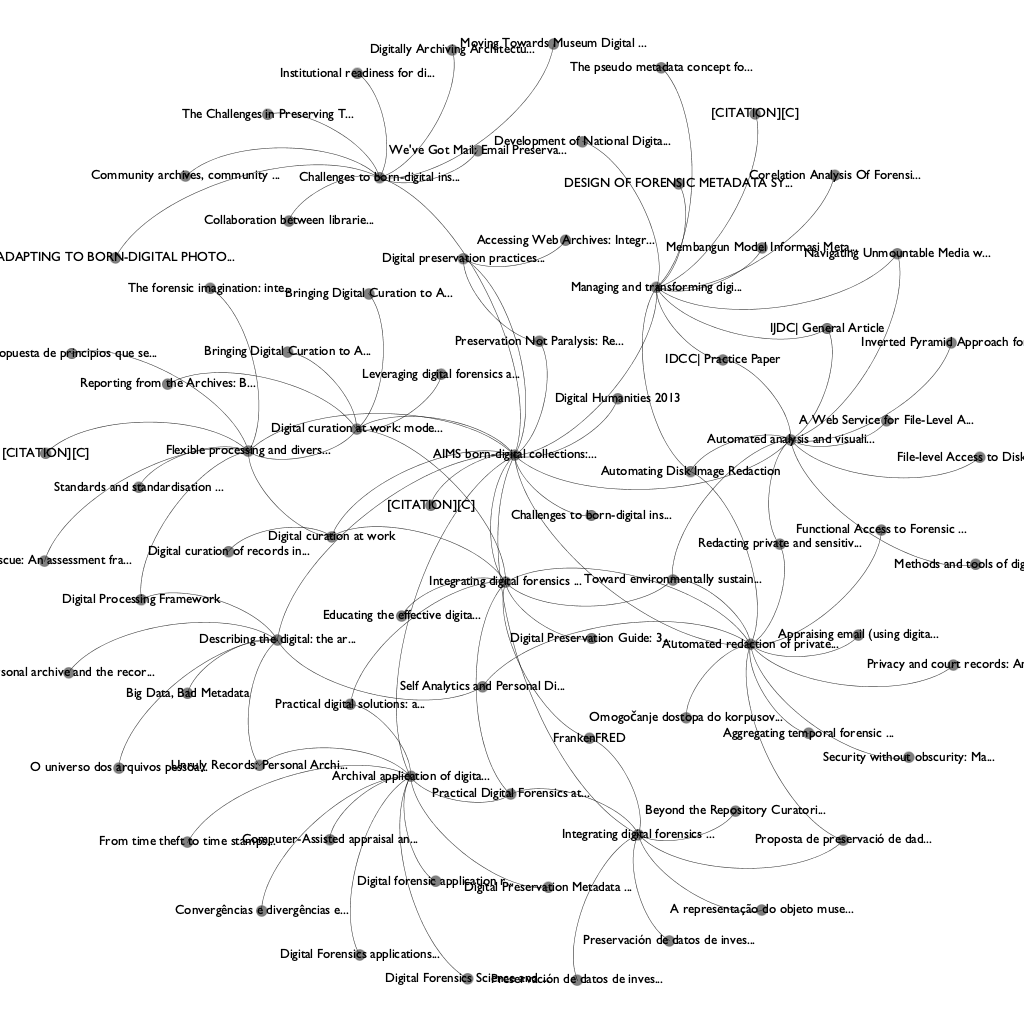
This citation network is for the AIMS project’s final report.
-
🔖 Foreign Objects X Eliza Collin X Genie Kausto An Introduction to the Bell System (2021) –
Still amazed by these #plan9 jumpsuits from the Foreign Objects piece for Further Experiments in Arts and Technology.
In An Introduction to the Bell System, we have made 5 embroidered jumpsuits exploring the history and working culture of the Computing Sciences Research Center at Bell Labs, between 1970-90. Though famous for the success of the Unix operating system and surrounding tools, the group’s cult status online is buoyed by a much wider array of playful, experimental and sometimes anarchic work, in an era where the identity of “tech worker” was yet to be defined. This project is a form of fan art: each suit considers a strand of research from this era at Bell through the projects, in-jokes and ephemera.
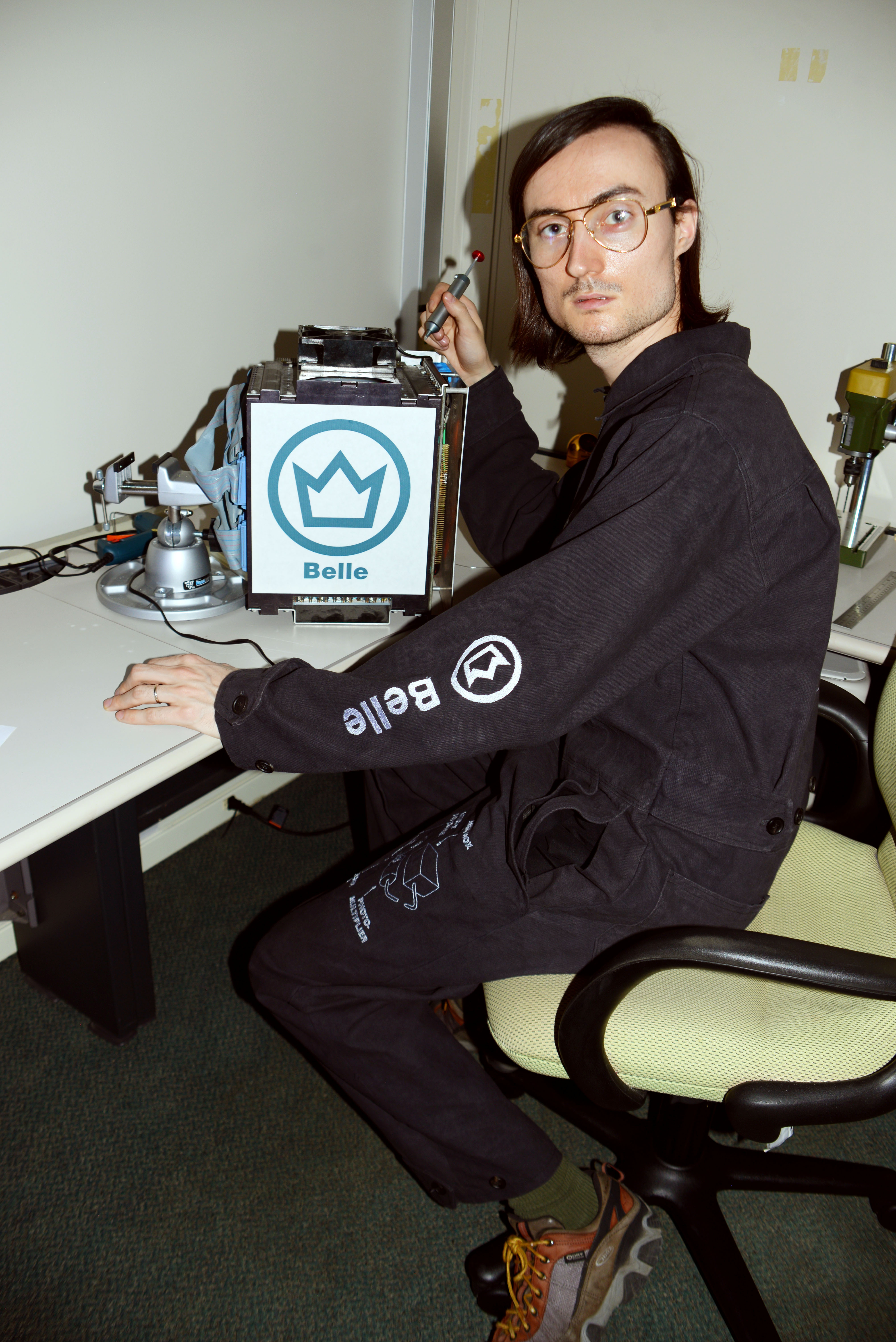
-
🔖 Embracing radical prioritization –
Great post from Michael Della Bitta, DPLA’s Director of Technology:
If the team takes on too many tasks, there’s a risk of not making tangible progress on any of them, leaving the organization no further along than when we started. So there needs to be a concerted accounting of what work is potentially on the table, and a process to scope, prioritize, and ultimately reduce the work to a finite and achievable set of tasks. …
However, this process is a difficult one to undertake. Everybody working at DPLA has a mile-long list of projects we might try, and watching them be sidelined for other work can be painful. Still, we’re never saying “no, not ever” to things that we leave off the 90-day plan, we’re just saying “not now.”
-
🔖 Raw Signal Group: Can you talk about why everyone is quitting? –
Back in the spring, we told you that every organization had a moment in front of them. A moment to decide what kind of pandemic employer they were going to be. Everything was on the table. And organizations made some wildly different choices. Choices they are still living with, a year on.
This is a moment again. And this time the question is how you want to meet your team as they come out of all this. How are you going to give back the hours of lengthened work day? How will you support them as they try to reset some work/life boundaries?
-
IAH Forecast - Disquiet Junto Project 0476
An experiment with recording a new single using VCV Rack and REAPER based on a compositional prompt. I ended up recording two tracks. -
🔖 Facilitating Retrospective in the Prison –
Remember the good old check-in activity for retrospectives called ESVP – Explorer, Shopper, Vacationer, Prisoner? I couldn’t imagine that “Prisoner” would become so literal for me - until I found myself in a real prison facilitating a Retrospective for a group of my cellmates, political prisoners. This article describes some lessons that I learned from this unusual experience.
-
New reissue dropped, just in time for #BandcampFriday. Heavy tape/minidisc manipulation from another life era.
-
🔖 Deneocolonize Your Syllabus – Nonsite.org –
The brilliance of the American neocolonial turn was the way it was able to divide the European notion of universal “Culture” from the anticolonial need for oppositional local and national “cultures” in order to conquer both, leaving us with little more than toothless ideas about lifestyle, “difference,” and “resistance,” and the seemingly endless distraction of ever-disenfranchising “culture politics.” The legacy of that triumphant division and conquest structures our syllabi as much as it has the direction that world history has headed in since decolonization.
-
🔖 The Shadow Ring 09-27-1997 O'Brien's –
beacons flashed on the bills of gulls / a single feather dropped into the sea / it dropped silently into the sea / and i swum out into the water and cast out a net
-
struggling with precision in language to talk about the supernatural is not a new problem, but it can be really frustrating when you experience in concert with writer’s block. having a weekend really helped.
-
🔖 Patterns of Transformation: Designing Sex, Death, and Survival in the 21st Century –
We have all been to a gathering, a ritual, or an adventure that felt unrewarding or downright upsetting to be a part of. Then there are those experiences that we are absolutely over the moon for, experiences that remind us of who we are and why we are. Those experiences feel like magic, but it doesn’t take a spell to make them happen.
Seasoned experience designers, self-identified or not, tend to employ similar strategies, especially when it comes to opening people up to risk in a caring way. They share no common language for what they do, but there are clear patterns to what makes an intimate social experience transformational.
-
🔖 Fantômes - a zine of ghost stories, haunting images and occult practices –
Fantômes is a collaborative ghost story zine, bringing together story-telling, poetry, folklore, illustration and photography in small cobbled-together publication. It is a place to explore personal and collective ghosts, lend them a voice through summoning rituals, raw poetry or scribbled drawings and get familiar with their haunting presence.
-
🔖 An Interview with Robin Wall Kimmerer - Believer Magazine –
Mosses are so very permeable. I think about them in contrast to higher plants, which have barriers and boundaries, waxy leaves and so forth, trying to keep the inside in and the outside out. But mosses don’t have that capacity and therefore they’re really intimate with their environment. And that means there is a relinquishment of control. When moss dries out, it dries out. But that’s not the end of the world. You just wait and it’ll be wet again. And, you know, no harm done. It’s that notion of control and having all needs satisfied—or all wants satisfied—at all times that, of course, our society and our economies have really propelled us toward. That notion that we’re entitled to the wealth of the world and to comfort and to convenience is pretty new for humans. And those comforts and conveniences themselves can be barriers to intimacy and connection and relationality because they make us think it’s all about us and our needs, which are not independent of the needs and desires of the millions of other species on the planet.
-
🔖 Thou Make Us a Hardcore Mixtape | self-titled –
Bryan Funck had a better idea: How about a mixtape of crucial hardcore music instead, complete with liner notes and a two-side ‘tape’ entitled If You Don’t Like This Music, We Can’t Be Friends? We got our start in Buffalo’s sXe scene during the ’90s, so the answer was simple: Well, yeah.
-
🔖 We’re All Preppers Now | Live Like the World is Dying –
I used to feel the relationship between individual and community preparedness as a tension: I was one of the only people I knew who focused on prepping before Covid, and I wondered what the point of it was. I don’t believe in individualist survival, so what good is it if I, and only I, have a gas mask or a few months of dried food lying around? Then, come Covid, I learned what the point is. The point of being prepared, as an individual, is that you’re better situated to help your community.

